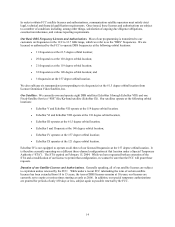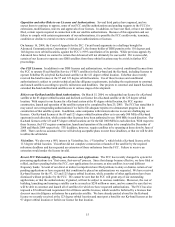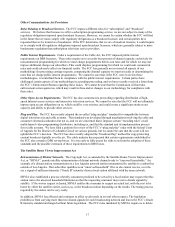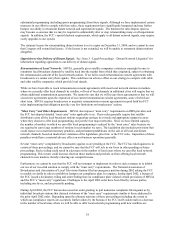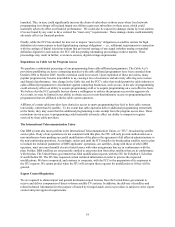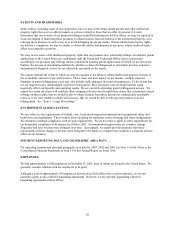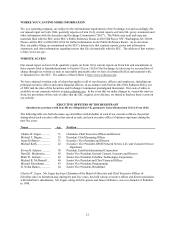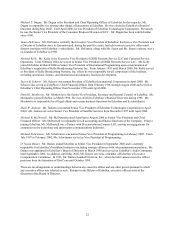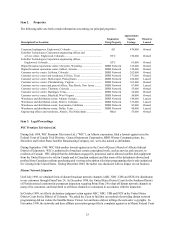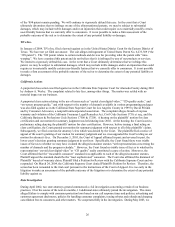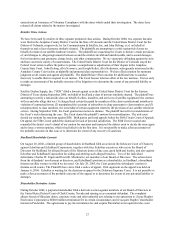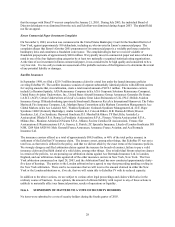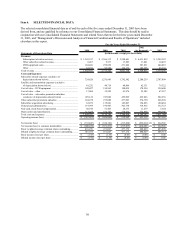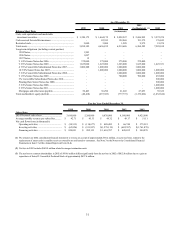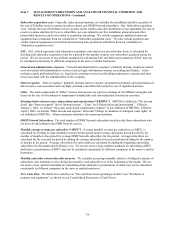Dish Network 2003 Annual Report Download - page 29
Download and view the complete annual report
Please find page 29 of the 2003 Dish Network annual report below. You can navigate through the pages in the report by either clicking on the pages listed below, or by using the keyword search tool below to find specific information within the annual report.24
alleging, among other things, copyright infringement. The Court combined the case that we filed in Colorado with the
case in Miami and transferred it to the Miami Federal Court.
In February 1999, the networks filed a Motion for Temporary Restraining Order, Preliminary Injunction and Contempt
Finding against DirecTV, Inc. in Miami related to the delivery of distant network channels to DirecTV customers by
satellite. DirecTV settled that lawsuit with the networks. Under the terms of the settlement between DirecTV and the
networks, some DirecTV customers were scheduled to lose access to their satellite-provided distant network channels
by July 31, 1999, while other DirecTV customers were to be disconnected by December 31, 1999. Subsequently,
substantially all providers of satellite-delivered network programming other than us agreed to this cut-off schedule,
although we do not know if they adhered to this schedule.
In April 2002, we reached a private settlement with ABC, Inc., one of the plaintiffs in the litigation and jointly filed
a stipulation of dismissal. In November 2002, we reached a private settlement with NBC, another of the plaintiffs in
the litigation and jointly filed a stipulation of dismissal. On March 10, 2004, we reached a private settlement with
CBS, another of the plaintiffs in the litigation and jointly filed a stipulation of dismissal. We have also reached
private settlements with many independent stations and station groups. We were unable to reach a settlement with
five of the original eight plaintiffs –Fox and the associations affiliated with each of the four networks.
A trial took place during April 2003 and the Court issued its final judgment in June 2003. The District Court found
that with one exception our current distant network qualification procedures comply with the law. We have revised
our procedures to comply with the District Court’s Order. Although the plaintiffs asked the District Court to enter
an injunction precluding us from selling any local or distant network programming, the District Court refused.
While the networks did not claim monetary damages and none were awarded, they are seeking approximately $10.0
million of attorney fees.
The District Court’s injunction requires us to use a computer model to re-qualify, as of June 2003, all of our
subscribers who receive ABC, NBC, CBS or Fox programming by satellite from a market other than the city in
which the subscriber lives. The Court also invalidated all waivers historically provided by network stations. These
waivers, which have been provided by stations for the past several years through a third party automated system,
allow subscribers who believe the computer model improperly disqualified them for distant network channels to
none-the-less receive those channels by satellite. Further, even though the Satellite Home Viewer Improvement Act
provides that certain subscribers who received distant network channels prior to October 1999 can continue to
receive those channels through December 2004, the District Court terminated the right of our grandfathered
subscribers to continue to receive distant network channels.
We believe the District Court made a number of errors and appealed the District Court’s decision. Plaintiffs cross-
appealed. The Court of Appeals granted our request to stay the injunction until our appeal is decided. Oral
argument occurred on February 26, 2004. It is not possible to predict how or when the Court of Appeals will rule on
the merits of our appeal.
In the event the Court of Appeals upholds the injunction, and if we do not reach private settlement agreements with
additional stations, we will attempt to assist subscribers in arranging alternative means to receive network channels,
including migration to local channels by satellite where available, and free off air antenna offers in other markets.
However, we cannot predict with any degree of certainty how many subscribers will cancel their primary DISH
Network programming as a result of termination of their distant network channels. We could be required to
terminate distant network programming to all subscribers in the event the plaintiffs prevail on their cross-appeal and
we are permanently enjoined from delivering all distant network channels. Termination of distant network
programming to subscribers would result, among other things, in a reduction in average monthly revenue per
subscriber and a temporary increase in churn.


